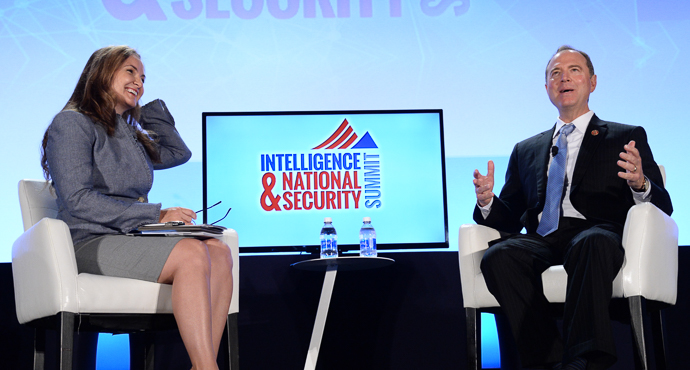
The view of cybersecurity from Congress.
Two members of Congress spoke to the Intelligence and National Security Summit on Thursday, September 7, 2017. They represented the House and the Senate; both were the Democratic ranking members of their intelligence oversight committees. The CipherBrief's Suzanne Kelly interviewed them.
A conversation on cybersecurity with Representative Adam Schiff.
Rep. Adam Schiff (D-California, House Intelligence Committee) began with some polite remarks about bipartisan cooperation, and described the Committee as "busy," with investigations into Russian influence operations having been added to its normal workload.
Challenges of oversight.
Schiff noted the distinctive challenge of intelligence oversight: when so much of your work is necessarily conducted in closed, restricted sessions, it's difficult to get sound reality checks from outside stakeholders. He did, however, salute the professionalism of the Intelligence Community, and said he felt his Committee was getting the cooperation it needs from the IC.
He thinks that in Congress there's an awareness of the cyber threats the nation faces, and a determination to do something about them, but there's as yet no consensus as to how to deal with them. Turning to public awareness, Schiff believes people have a vivid sense of the threat posed by North Korea. And, while the virtual Caliphate remains a problem, he's surprised we don't hear more about American and allied successes against ISIS, particularly success in reducing the territory ISIS controls.
FISA Section 702 reauthorization.
When he responded to questions about a matter of intense interest to the Intelligence Community stakeholders attending the Summit, Schiff said he expected Section 702 of the Foreign Intelligence and Surveillance Act to be reauthorized. The Judiciary and Intelligence Committees understandably have different perspectives on the matter, but he foresees no serious obstacles to reauthorization. He is confident that there are sufficient safeguards in place to allay fears of any threat to civil liberties. The House Intelligence Committee, he believes, is well equipped to exercise its oversight responsibilities in ways that should control any potential abuses of power. He also feels the FISA Court is serving as a responsible check on the authority granted under 702.
Cyber threats to critical infrastructure.
Critical infrastructure protection fell out of cyber information sharing bill, Schiff said. This is a complex field with many cross-currents of responsibility, and may divergent approaches to fulfilling them. It's also "a very asymmetric field," he said. "The attacker has the advantage. Our adversaries know we won't disclose all, so the adversaries will always have a measure of deniability.
Election security: room for work.
Representative Schiff was not so sanguine about election security. He thinks our systems are vulnerable, and that the Federal Government isn't doing enough to secure voting.
Election officials at the state and local level, Schiff thinks, should maintain a paper trail of voting. He thinks failure to do so is negligent. He also thinks the Federal Government in general and the Intelligence Community in particular need to come up with ways in which they can share information more transparently with the states. He hopes to bring state election officials to Washington to discuss vulnerabilities with the House Intelligence Committee.
Asked about scope of Russian influence on the last national election, Schiff said that of course that was what they were investigating. But he cautioned the audience on thinking there was any simple way of handling hostile influence operations. "There is no software patch for what happened in 2016. The best protection is a consensus that foreign intervention must be repudiated." (He noted parenthetically that it seemed bewildering that the Russians themselves, who used to regard, in Soviet times, everything published in Pravda as a lie, have become so credulous about their media. They could use some healthy skepticism, as could we.) Above all else, the Russians wanted to sow discord in the US. "They see our divisions as a vulnerability." Thus the importance of bridging those divisions.
A conversation with Senator Mark Warner.
Senator Mark Warner, (D-Virginia) succeeded Rep. Schiff on the stage and offered his perspective on the Senate Intelligence Committee. That Committee, he said, is one of the last bodies in the Senate to still function on a bipartisan basis. He also said he'd seen signs of improvement in relations between the President and the Intelligence Community, a relationship that had been strained.
Taking up particular issues of concern to the Intelligence Committee, Warner saw security clearance reform and the ability to recruit necessary talent as key challenges for the Community. One obvious reform in the clearance process would be a move to replace automatic five-year reviews with risk-based re-investigations. And he concurred with those who think the acquisition process an obstacle to rapid fielding of technologies. Space-based, overhead collection capabilities in particular, he thought suffer under the slow, classic acquisition model.
And he too expected Section 702 to be reauthorized.